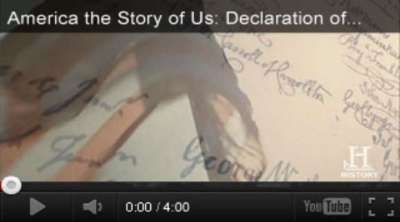The groundbreaking document that birthed democracy in the New World
The history of the first constitutional agreement made between the original 13 states in 1776, drafted by John Dickinson and debated at the Second Continental Congress, the Articles of Confederation are the precursor to the Constitution as we know it today. This reference includes information on the history, timeline, and scope of the first federal constitution.Articles of Confederation (1776)
Source: The U.S. Government Printing Office
After declaring its independence from Great Britain at the start of the Revolutionary War, the new country situated on the eastern seaboard of North America needed to fashion some form of governmental system. The Articles of Confederation represent the first constitutional agreement made between the 13 American states. There was a need for unity among the new states that were created as a result of the American Revolution. The relative powers of the individual states and the Continental Congress also needed to be defined for the young country. These realities led Congress to entrust John Dickinson with the drafting of a federal constitution.
This federal constitution was called the Articles of Confederation and was submitted to the Second Continental Congress on July 12, 1776.
- the apportionment of taxes according to the population
- the granting of 1 vote per state
- the right of the federal government to dispose of public lands in the West
This debate led to several revisions and the document was adopted by the Congress on November 15, 1777. In its final form, the Articles of Confederation were comprised of a preamble and 13 articles. The document maintained the aspect of voting done by states, but taxes were based upon the value of buildings and land and not by a state's population. The Articles also specified that no state could be deprived of territory for the benefit of the country and that all 13 states had to agree to any amendment of the federal government's power.
The Articles of Confederation became the ruling document in the new nation after they were ratified by the last of the 13 American states, Maryland, in 1781. The Articles created a nation that was a league of friendship and perpetual union. The state governments retained most of the power under this framework, with a subordinate position given to the central government. The central government commanded little respect and was not able to accomplish much because it had little jurisdiction over states or individuals.
The following are challenges in governing the new nation under the Articles of Confederation:
- Congress (the central government) was made up of delegates chosen by the states and could conduct foreign affairs, make treaties, declare war, maintain an army and a navy, coin money, and establish post offices. However, measures passed by Congress had to be approved by 9 of the 13 states.
- Congress was severely limited in its powers. It could not raise money by collecting taxes; it had no control over foreign commerce; it could pass laws but could not force the states to comply with them. Thus, the government was dependent on the willingness of the various states to carry out its measures, and often the states refused to cooperate.
- The articles were virtually impossible to amend, so problems could not be corrected.
In the words of George Washington, the government created by the Articles of the Confederation was "little more than the shadow without the substance." As the need for a stronger federal government began to be realized, leaders from throughout the states got together to decide how to create it. The Federal Constitutional Convention of 1787 was responsible for drafting the Constitution of the United States, the document which took the place of the Articles of Confederation in 1789.






